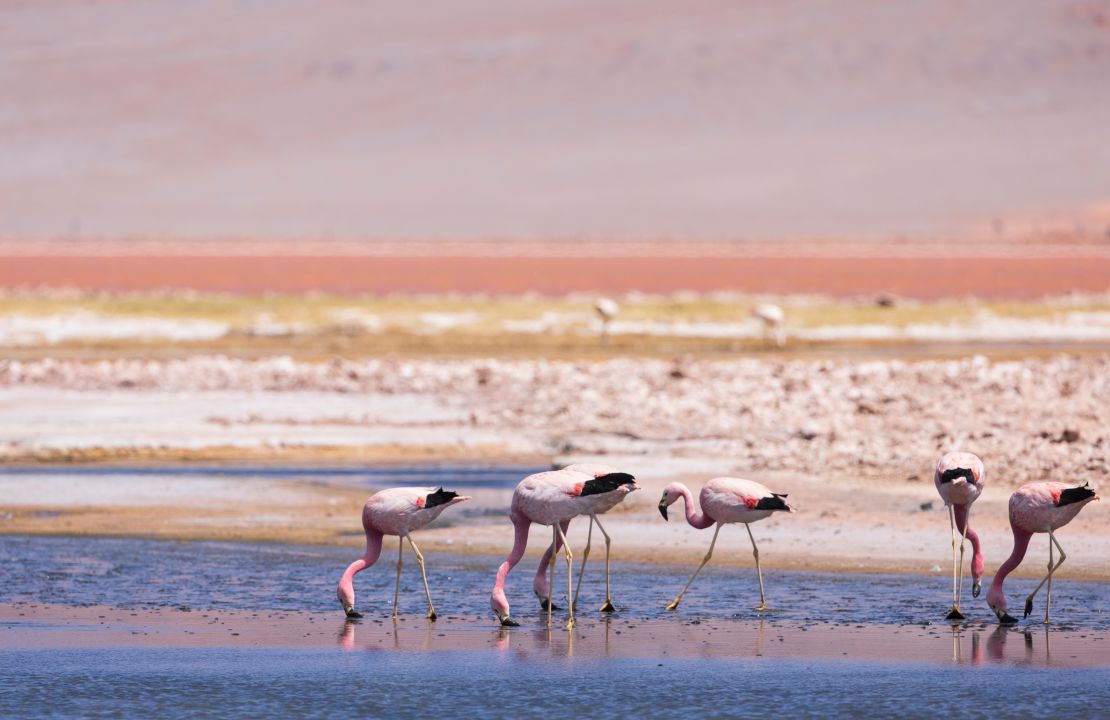Join CNN’s Surprise Concept science publication. Explore the universe with news on fascinating discoveries, scientific advancements and more.
CNN
—
Some 220 flamingos have been discovered lifeless within the province of Catamarca in northwestern Argentina on account of an outbreak of avian influenza, in any other case generally known as hen flu, an official advised native media.
Chook flu is a extremely contagious and lethal viral illness that naturally spreads by wild aquatic birds, corresponding to ducks, geese and swans, however can even infect different hen species, corresponding to home poultry, in response to the US Centers for Disease Control and Prevention.
The H5N1 pressure of avian influenza has unfold in additional than 80 nations since 2022, according to the World Health Organization, and consultants have issues amid its ongoing impression throughout continents. H5N1 is the predominant model inflicting issues within the Americas and Europe, and there are several subtypes of the virus reported because the illness repeatedly mutates, in response to WHO.
Across the globe, there have been reviews of hen flu outbreaks flaring in numerous mammals corresponding to seals and farmed mink, detection of H5N1 viruses in home cats and canines, in addition to a couple of circumstances reported in people.
At the moment, there is no such thing as a efficient remedy for the virus, in response to the New York State Wildlife Health Program.
The contaminated species — generally known as James’ flamingo (Phoenicoparrus jamesi), or the puna flamingo — is one in every of three sorts of flamingos present in northwestern Argentina. The birds pose a danger of spreading the illness to new areas during migration.
Initially, the H5N1 pressure unfold from North America to South America by migratory birds in a span of three months, in response to Dr. Johanna Harvey, a postdoctoral researcher of environmental science and know-how on the College of Maryland who has studied the pressure.
It solely takes one contaminated hen to move on the virus to an entire flock in a matter of days, Harvey stated, including that flamingos are identified to be highly gregarious, social animals that reside in massive flocks.

The H5N1 pressure poses a low risk to humans — since December 2021, 11 circumstances of the pressure have been reported in people globally, according to the CDC. However consultants are intently monitoring the deadly pathogen’s unfold to different mammals, corresponding to when greater than 50 sea lions had been discovered lifeless in August in Argentina due to infection of the virus.
“My issues are that it’s in a number of birds, birds are clearly persevering with to maneuver it, and it’s not going away … and as these mortalities pile up, the impression on populations, and probably even (whole) species, is actually nice,” Harvey stated. “The true magnitude of loss right here, I don’t consider is effectively understood and has not been documented, as a result of it’s a very exhausting factor to do.”
On this newest outbreak, the provincial director of biodiversity for Catamarca, Anabella Ahumada, confirmed the reason for demise of tons of of flamingos to native media, following optimistic check outcomes for H5N1 in 3 out of 6 samples taken from the lifeless birds by SENASA, Argentina’s Nationwide Meals Security and High quality Service.
Park rangers detected the excessive charges of mortality within the birds close to the our bodies of water Laguna Grande and Laguna Diamante, Ahumada advised native media outlet Catamarca 12. The province has been below epidemiological surveillance for the reason that begin of November, Catamarca 12 reported.
The Argentine authorities has beneficial that individuals don’t come into contact with sick or deceased birds with out ample safety.
Throughout america, zoos have been shifting their captive birds indoors as the speed of an infection continues to rise. In 2022, the Pittsburgh Zoo, the Denver Zoo, the Maryland Zoo and different amenities moved their hen species indoors away from folks and different wildlife. Final month, the Dallas Zoo moved its flamingos indoors, NBC 5 in the Dallas-Fort Worth metro area reported.
The virus has unfold by saliva, mucus and feces from contaminated birds, according to the CDC. In mammals, some scavenging species have are available in contact with the virus by consuming contaminated hen carcasses, Harvey stated.
“So far as folks interacting with wild birds, there doesn’t appear to be an enormous danger to them, as a result of the variety of human circumstances have remained low globally, so we’re not too fearful about that,” stated Dr. Krysten Schuler, an assistant analysis professor within the division of public and ecosystem well being at Cornell College’s School of Veterinary Medication in Ithaca, New York. “However the mutation potential and the huge distribution of this virus are the foremost danger components.”
James’ flamingo is listed as “close to threatened” on the International Union for Conservation of Nature’s Red List of Threatened Species, Schuler famous. The primary threats to the hen embrace habitat loss attributable to mining, in addition to human disturbances on account of leisure actions, in response to IUCN. When the virus impacts birds which can be already struggling population-wise, it may well have the potential to get rid of species, Schuler stated.
There may be not a lot that may be performed to cease the unfold of the virus, however Schuler recommends that individuals report any uncommon animal deaths with out an apparent trigger to their state wildlife businesses, to allow them to be notified of what areas the illness is spreading.
“If there’s any potential to do one thing about it, our greatest possibility is correct originally,” Schuler stated.

